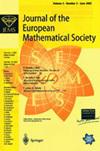量子仿射代数的PBW理论
IF 2.9
1区 数学
Q1 MATHEMATICS
引用次数: 7
摘要
设$U_q'(\mathfrak{g})$为任意类型的量子仿射代数,设$\mathcal{C}_{\mathfrak{g}}$为Hernandez-Leclerc的范畴。我们可以将量子仿射Schur-Weyl对偶函子$F_D$与$\mathcal{C}_{\mathfrak{g}}$中的对偶基准$D$联系起来。我们引入了强(完全)对偶数据$D$的概念,并证明了当$D$是强时,诱导对偶函子$F_D$将简单模传递给简单模,并保留了作者引入的不变量$\Lambda$和$\Lambda^\infty$。接下来我们定义作用于强对偶数据$D$上的反射$\mathcal{S}_k$和$\mathcal{S}^{-1}_k$。我们证明了$D$是一个强响应。完全)二元性的数据,那么$\mathcal{S}_k(D)$和$\mathcal{S}_k^{-1}(D)$也是强的(参见。完全对偶数据。最后,我们利用对偶函子$F_D$在$\mathcal{C}_{\mathfrak{g}}$中引入了仿射倒模的概念,并发展了类似于颤振Hecke代数的量子仿射代数的倒模理论。本文章由计算机程序翻译,如有差异,请以英文原文为准。
PBW theory for quantum affine algebras
Let $U_q'(\mathfrak{g})$ be a quantum affine algebra of arbitrary type and let $\mathcal{C}_{\mathfrak{g}}$ be Hernandez-Leclerc's category. We can associate the quantum affine Schur-Weyl duality functor $F_D$ to a duality datum $D$ in $\mathcal{C}_{\mathfrak{g}}$. We introduce the notion of a strong (complete) duality datum $D$ and prove that, when $D$ is strong, the induced duality functor $F_D$ sends simple modules to simple modules and preserves the invariants $\Lambda$ and $\Lambda^\infty$ introduced by the authors. We next define the reflections $\mathcal{S}_k$ and $\mathcal{S}^{-1}_k$ acting on strong duality data $D$. We prove that if $D$ is a strong (resp.\ complete) duality datum, then $\mathcal{S}_k(D)$ and $\mathcal{S}_k^{-1}(D)$ are also strong (resp.\ complete ) duality data. We finally introduce the notion of affine cuspidal modules in $\mathcal{C}_{\mathfrak{g}}$ by using the duality functor $F_D$, and develop the cuspidal module theory for quantum affine algebras similarly to the quiver Hecke algebra case.
求助全文
通过发布文献求助,成功后即可免费获取论文全文。
去求助
来源期刊
CiteScore
4.50
自引率
0.00%
发文量
103
审稿时长
6-12 weeks
期刊介绍:
The Journal of the European Mathematical Society (JEMS) is the official journal of the EMS.
The Society, founded in 1990, works at promoting joint scientific efforts between the many different structures that characterize European mathematics. JEMS will publish research articles in all active areas of pure and applied mathematics. These will be selected by a distinguished, international board of editors for their outstanding quality and interest, according to the highest international standards.
Occasionally, substantial survey papers on topics of exceptional interest will also be published. Starting in 1999, the Journal was published by Springer-Verlag until the end of 2003. Since 2004 it is published by the EMS Publishing House. The first Editor-in-Chief of the Journal was J. Jost, succeeded by H. Brezis in 2004.
The Journal of the European Mathematical Society is covered in:
Mathematical Reviews (MR), Current Mathematical Publications (CMP), MathSciNet, Zentralblatt für Mathematik, Zentralblatt MATH Database, Science Citation Index (SCI), Science Citation Index Expanded (SCIE), CompuMath Citation Index (CMCI), Current Contents/Physical, Chemical & Earth Sciences (CC/PC&ES), ISI Alerting Services, Journal Citation Reports/Science Edition, Web of Science.

 求助内容:
求助内容: 应助结果提醒方式:
应助结果提醒方式:


